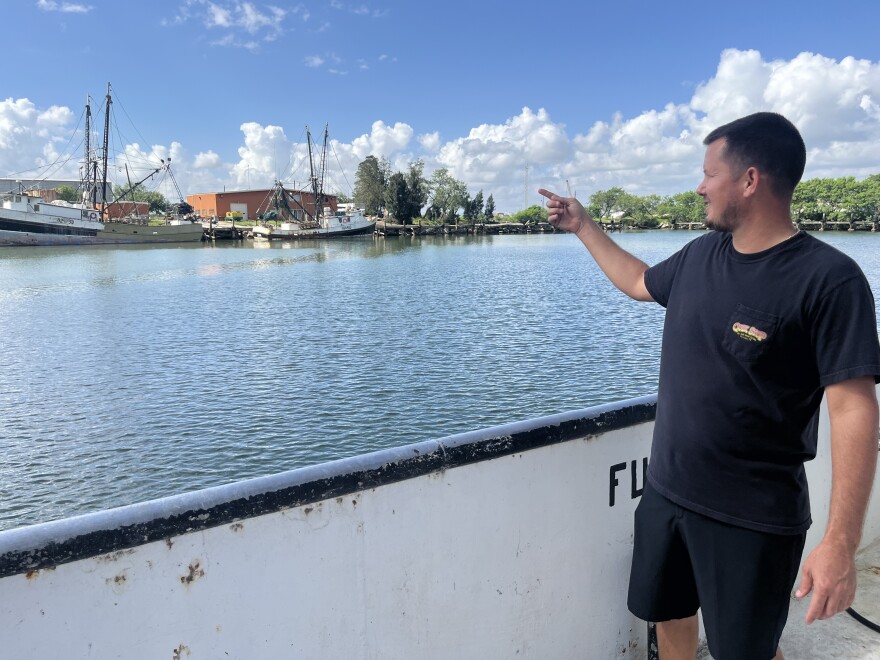Sign up for TPR Today, Texas Public Radio's newsletter that brings our top stories to your inbox each morning.
SOUTH PADRE ISLAND — On a recent hot, humid day, James Galloway tooled around the captain's quarters of his shrimping boat.
Docked in the Port of Brownsville, the vessel should have been out in the bay catching shrimp with nets that spread like butterfly wings over the water. But like so many of his colleagues, Galloway couldn’t find enough workers to even leave the dock, much less fish. He said no one wants to work in shrimping anymore because the money just isn’t there.
Brownsville used to be known as the shrimping capital of the world. At the height of the local industry some 450 shrimping boats would go out into the bay to catch highly coveted Texas brown shrimp that restaurants around the world would boast about on their menus.
“Ten or twenty years ago, half the shrimp in the U.S. was wild caught Gulf shrimp,” said Sid Miller, commissioner of the Texas Department of Agriculture. “Now it's less than 10%. Ninety-percent of the shrimp sold in the United States now is foreign-farm raised, and I've got a lot of problems with that.”

As Americans’ appetite for seafood has increased, so has the profit potential for the seafood industry. Seeing an opportunity, foreign companies have flooded the market with farm-raised seafood, using slave labor and other practices outlawed in the U.S. to keep prices low, Miller said.
On top of ethical issues there are also numerous health concerns associated with farm-raised shrimp, said Chris Londrie, president of the Texas Shrimp Association, which advocates for the local industry.
For example, since farm-raised shrimp live in tight quarters, when they get hungry they will eat their own excrement or even each other. That makes them sick. To keep them healthy they’re pumped with antibiotics or other medicines, some of which are banned in the U.S.
“And the U.S. consumer is eating those items,” Londrie added.
He said a new state law that requires wholesalers to indicate whether shrimp is farm raised on the packaging — an attempt to educate restaurants and other buyers on the product they’re purchasing — is a good first step.
“Hopefully it is just a first step because when you read the language of the law, it is essentially a law in word only,” he said.
Londrie and shrimpers alike argue more government intervention is needed because otherwise, a cheaper competitor mixed with high fuel costs and labor shortages will soon eliminate the local industry entirely. According to Carlton Reyes, a shrimp-boat owner in Brownsville and the vice president of the Texas Shrimp Association, fewer than 100 boats left the Port of Brownsville when shrimping season started this year.
“We’re seeing the number of shrimp boats shrink,” Miller said. “Another two years, if it’s going like it is, there won’t be anybody left. It’s that bad.”
A family affair
Galloway is a third-generation shrimper. His grandfather taught his father, who taught James when he was a kid.
“I started working on a bay shrimp boat when I was 14 years old,” James said. “I did that for four or five years while I was home-schooling. At about 19 I went offshore drilling and did that for about nine years. I worked overseas, Africa, Brazil, Korea.”
After he was laid off he got back into seafood, this time as a wholesaler. But he always wanted to own his own boats, so when a family friend was getting out of shrimping and looking to offload his vessels, Galloway returned to South Texas and officially entered the family business.

The problems the shrimping industry faces are multifaceted, Galloway said. Shrimping falls outside of the U.S. Department of Agriculture, so unlike farming it can’t access foreign laborers or subsidies to help it through the lean years.
“There's so many people, I think, especially from Mexico and other places, they want to come over here and work,” he said. “I have a boat at the dock right now, and I don't have no crew.”
Galloway bought his first boat about five years ago and has yet to take a paycheck from it. But he considers himself lucky: He owns several other businesses, so he doesn’t need the money from shrimping.
Londrie pointed to Louisiana, where restaurants are required to indicate on menus whether the shrimp they sell is farm raised, as an example Texas could follow to help resuscitate the local shrimping industry. He also said consumers can be more mindful of the seafood they eat to ensure it’s locally caught and sustainable.
“This doesn’t just affect the shrimp boats,” Galloway said of the local-industry downturn. “There’s so much that goes into the shrimping industry. [There are] the people that work on the boats, prepare the boats, parts, the nets. This is a big, big circle.”


